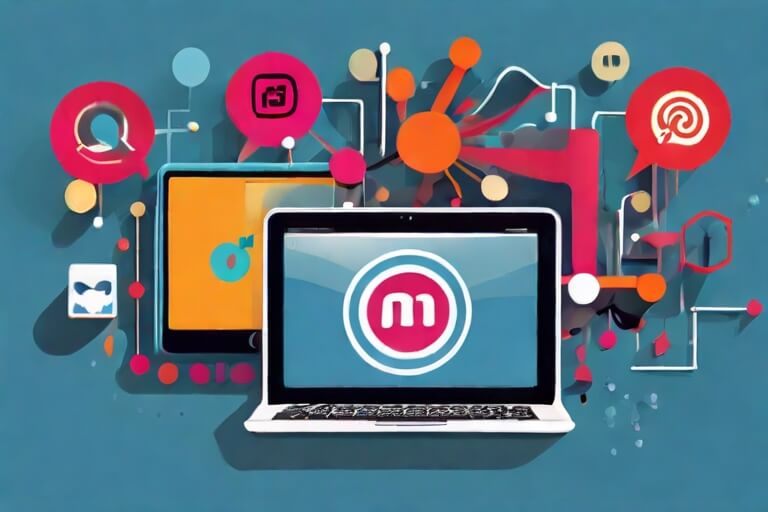TL;DR
- Chatbots have revolutionized the way businesses interact with customers on social media platforms.
- Personalization is a key advantage of chatbots, making each customer engagement feel unique and tailored to their needs.
- Artificial intelligence allows chatbots to analyze customer data, preferences, and behavior for personalized recommendations and solutions.
- Chatbots collect and analyze customer data, including past interactions, purchase history, and preferences to create individual profiles.
- Real-time data such as browsing patterns or social media activity can be used by chatbots to provide personalized recommendations or targeted promotions.
- Natural language processing enables chatbots to adapt their tone and language based on customer sentiment and emotion for a more human-like interaction experience.
- Personalized interactions through chatbots enhance customer satisfaction and engagement on social media platforms.
- Customers feel valued when they receive personalized recommendations or solutions that address their specific needs.
- The efficiency and accuracy of chatbots in providing personalized interactions contribute to a positive customer experience.
- Advancements in AI technology will continue to increase the role of chatbots in enhancing customer engagement.
- Businesses can leverage this opportunity to connect with their target audience on social media platforms.
AI-driven chatbots have revolutionized customer engagement by providing automated, personalized interactions at scale. These intelligent virtual assistants are powered by artificial intelligence algorithms that enable them to understand, interpret, and respond to customer queries in a human-like manner. By leveraging natural language processing (NLP) and machine learning capabilities, chatbots can accurately comprehend and analyze customer messages, allowing them to offer relevant and timely solutions. With their ability to handle multiple customer interactions simultaneously and provide instant responses, AI-driven chatbots significantly improve response times and enhance overall customer experience.
One key advantage of AI-driven chatbots is their round-the-clock availability. Unlike human agents who are bound by working hours, chatbots can be available 24/7, ensuring that customers have access to support whenever they need it. This accessibility is especially crucial in today’s fast-paced digital world, where customers often seek immediate assistance. Additionally, chatbots can handle repetitive and mundane inquiries, freeing up human agents to focus on more complex customer issues. This not only saves time and resources but also enables businesses to deliver prompt and efficient support to their customers. By implementing AI-driven chatbots, organizations can streamline their customer service operations, boost customer satisfaction, and ultimately drive business growth.
To explore more articles in this category, discover other insightful pieces on leveraging chatbots to improve customer service in social media platforms and enhancing customer experience through AI-powered chatbot technology. These articles delve deeper into the practical steps and best practices for implementing chatbots effectively and offer real-life case studies highlighting successful chatbot integration. By learning from these resources, businesses can gain a comprehensive understanding of how to utilize chatbots to personalize customer interactions, overcome integration challenges, and measure the impact on customer engagement in social media platforms.
Leveraging Chatbots to Improve Customer Service in Social Media Platforms
As social media platforms continue to flourish as a means of customer engagement, businesses are seeking innovative ways to provide efficient and effective customer service. This is where chatbots come into play. Leveraging chatbots to improve customer service in social media platforms has become a game-changer for businesses, offering a multitude of benefits.
One of the key advantages of using chatbots is their 24/7 availability, enabling businesses to provide round-the-clock support to their customers. This eliminates the frustration of waiting for a response and ensures that customers receive timely assistance, regardless of the time of day. Additionally, chatbots can handle multiple customer inquiries simultaneously, ensuring a swift response time and enhancing overall customer satisfaction.
Moreover, chatbots can be programmed to quickly analyze customer queries and provide accurate and relevant answers. Their ability to understand natural language and context allows them to comprehend complex customer requests, enabling seamless interactions. This not only assists in issue resolution but also gives customers the impression of personalized service, adding a touch of human-like interaction to their social media experience.
The use of chatbots for customer service in social media platforms is transforming the way businesses engage with their customers. Through their round-the-clock availability, multitasking abilities, and language processing capabilities, chatbots have revolutionized customer service, offering prompt, efficient, and personalized support. Implementing chatbots in social media platforms is a strategic step towards improving customer service and building stronger customer relationships. Explore other articles in this category to learn more about the role of AI-driven chatbots in enhancing customer engagement.
Enhancing Customer Experience through AI-powered Chatbot Technology
AI-powered chatbot technology has revolutionized the way businesses interact with their customers, providing an enhanced customer experience that is tailored to meet individual needs. By harnessing the power of artificial intelligence, chatbots have become integral in streamlining customer service processes and personalizing customer interactions. With their ability to understand natural language and provide accurate responses in real-time, AI-powered chatbots have significantly improved customer satisfaction and engagement.
One of the key benefits of using AI-powered chatbots for customer engagement is the 24/7 availability they offer. Unlike human agents, chatbots do not require breaks or sleep, ensuring that customers can receive assistance at any time of the day. This round-the-clock accessibility not only enhances convenience for customers, but it also allows businesses to provide excellent customer service across different time zones and cater to global audiences. Furthermore, utilizing AI-driven chatbots frees up human resources, enabling organizations to allocate their staff’s time and expertise to more complex customer queries and strategic initiatives.
To make the most out of AI-powered chatbot technology, businesses should follow some best practices. Firstly, it is essential to clearly define the bot’s purpose and scope to ensure it is aligned with business goals and customer expectations. Secondly, training the chatbot with large data sets and continuous learning through customer interactions helps improve its accuracy and effectiveness. Additionally, implementing a well-designed user interface and seamless integration with existing systems can optimize the customer experience. Lastly, it is crucial to regularly monitor and analyze chatbot performance to identify areas for improvement and ensure ongoing success.
AI-powered chatbot technology has transformed customer experience by providing personalized, efficient, and round-the-clock support. By following best practices and harnessing the power of AI, businesses can maximize the benefits of chatbots and elevate customer engagement to new heights. To explore more articles on leveraging chatbots for customer engagement in social media, be sure to check out our comprehensive category on implementing AI-driven solutions.
The Benefits of Using Chatbots for Customer Engagement in Social Media
In today’s fast-paced digital world, customer engagement plays a vital role in building brand loyalty and driving business growth. Social media platforms have become an integral part of our lives, making it crucial for businesses to leverage these platforms effectively. This is where AI-powered chatbots come into play. Chatbots are revolutionizing the way businesses engage with their customers on social media, offering a wide range of benefits.
First and foremost, chatbots provide a seamless and consistent customer experience. With their ability to handle multiple conversations simultaneously, chatbots can engage with customers in real-time, ensuring prompt and efficient responses. They are available 24/7, eliminating the frustration of waiting for customer support during off-hours. This not only improves customer satisfaction but also enhances the overall brand image.
Secondly, chatbots help businesses save time and resources. By automating repetitive tasks such as answering frequently asked questions or providing basic information, chatbots free up human agents to focus on more complex and high-value customer interactions. This not only increases efficiency but also reduces the cost of customer service. Moreover, chatbots can easily integrate with existing systems and databases, retrieving relevant customer information instantly, allowing for more personalized interactions.
Chatbots are undoubtedly revolutionizing customer engagement on social media platforms. Their ability to offer a seamless experience, save time and resources, and provide personalized interactions makes them a valuable tool for businesses. Implementing chatbots effectively requires careful planning and consideration. In the upcoming articles in this series, we will explore best practices, challenges, successful case studies, and more. Stay tuned to uncover the full potential of chatbots in enhancing customer engagement in social media.
Implementing Chatbots: Best Practices for Effective Customer Engagement
Effective customer engagement is crucial in today’s competitive business landscape, and implementing chatbots is one of the best practices that can help businesses achieve that. These AI-powered virtual assistants can offer real-time support and personalized interactions on social media platforms, enhancing the overall customer experience.
To successfully implement chatbots for effective customer engagement, businesses should consider the following best practices:
1. Define clear objectives: Before implementing chatbots, it is important to clearly define the goals and objectives they are expected to achieve. Whether it is providing instant responses to customer queries, generating leads, or offering proactive assistance, having a clear purpose will ensure that the chatbot is tailored to meet these specific requirements.
2. Train the chatbot effectively: Chatbots need to be well-trained to understand customer requests and provide accurate and relevant responses. This requires comprehensive training using real customer data and scenarios to ensure that the chatbot can handle various situations effectively. Regular updates and continuous learning techniques should also be incorporated to improve the performance of the chatbot over time.
By following these best practices, businesses can leverage chatbots to enhance customer engagement on social media platforms. With the right implementation and training, chatbots can streamline customer interactions, provide instant support, and ultimately improve the overall customer experience. To explore more articles on this topic and learn how chatbots can benefit your business, continue reading our series on leveraging AI-driven technology for customer engagement in social media.
How Chatbots Can Personalize Customer Interactions in Social Media
The increasing presence of chatbots in social media platforms has revolutionized the way businesses interact with their customers. One of the key advantages of chatbots is their ability to personalize customer interactions, making each engagement feel unique and tailored to the individual customer’s needs. By leveraging artificial intelligence (AI), chatbots can analyze customer data, preferences, and behavior to provide personalized recommendations, answers, and solutions.
To personalize customer interactions, chatbots utilize a variety of techniques. Firstly, they collect and analyze customer data, including past interactions, purchase history, and preferences. This data is then used to create customer profiles, allowing chatbots to understand individual preferences and tailor responses accordingly. Furthermore, chatbots can use real-time data such as browsing patterns or social media activity to provide personalized recommendations or targeted promotions. By analyzing customer sentiment and emotion through natural language processing, chatbots can also adapt their tone and language to match the customer’s mood, creating a more human-like and personalized interaction experience.
By personalizing customer interactions, chatbots can significantly enhance customer satisfaction and engagement on social media platforms. Customers feel valued and understood when they receive personalized recommendations or solutions that address their specific needs. The efficiency and accuracy of chatbots in providing personalized interactions further contribute to a positive customer experience. With the continuous advancements in AI technology, chatbots are expected to play an increasingly vital role in customer engagement, offering businesses new opportunities to connect with their target audience on social media platforms.
Overcoming Challenges: Ensuring Smooth Integration of Chatbots in Social Media
One of the key challenges in integrating chatbots into social media platforms is ensuring a seamless user experience. A clunky or inefficient chatbot can frustrate users and lead to a negative perception of the brand. To overcome this challenge, it is essential to thoroughly test the chatbot before its implementation. Conducting extensive user testing can help identify any potential issues and fine-tune the chatbot’s responses to ensure they align with users’ expectations. Additionally, providing a clear and intuitive interface for users to interact with the chatbot can significantly enhance the integration process.
Another challenge in integrating chatbots into social media platforms is maintaining a personalized and human-like interaction. Users expect a certain level of personalization and conversational tone when engaging with chatbots. To address this, it is important to develop a robust natural language processing (NLP) system that can understand user queries and respond appropriately. This can involve training the chatbot with a large dataset of real user conversations to improve its language comprehension capabilities. Furthermore, regularly monitoring and updating the chatbot’s responses based on user feedback can help ensure that it remains updated and relevant.
In conclusion, overcoming the challenges of integrating chatbots into social media platforms requires a careful approach. By thoroughly testing the chatbot, providing an intuitive interface, and personalizing the conversation, businesses can enhance the user experience and drive positive customer engagement. To learn more about the implementation of chatbots and their benefits in social media, explore our other articles in this category.
Measuring the Impact of Chatbots on Customer Engagement in Social Media
As the use of chatbots continues to rise in social media platforms, companies are increasingly interested in measuring the impact these AI-driven tools have on customer engagement. Understanding the effectiveness of chatbots in this context is crucial for businesses looking to optimize their customer service strategies.
One of the key metrics used to measure the impact of chatbots on customer engagement is response time. Chatbots are designed to provide instant responses to customer queries, eliminating the need for customers to wait for a human agent. By analyzing response time data, businesses can assess the efficiency of their chatbot systems and make necessary improvements to enhance customer experience. Additionally, measuring the percentage of queries resolved successfully by the chatbot can provide insights into its efficacy in handling customer inquiries. By continuously monitoring and analyzing these metrics, companies can determine the impact of chatbots on customer engagement and identify areas for improvement.
Measuring the impact of chatbots on customer engagement in social media is vital for businesses seeking to enhance their customer service capabilities. By focusing on key metrics such as response time and query resolution rate, companies can assess the effectiveness of their chatbot systems and make data-driven improvements. It is important for businesses to invest time and resources in monitoring and analyzing these metrics to optimize customer engagement and ultimately drive business growth. For a more in-depth understanding of implementing chatbots for effective customer engagement, explore our other articles in this category.
Case Studies: Successful Implementation of Chatbots for Customer Engagement
Successful implementation of chatbots for customer engagement has become a prominent strategy for businesses across various industries. In one case study, a leading e-commerce company saw a significant improvement in customer satisfaction after integrating chatbot technology into their social media platforms. By leveraging AI-driven chatbots, the company was able to provide quick and efficient responses to customer queries, resulting in reduced response time and increased customer engagement. The chatbots were able to handle a large volume of customer inquiries simultaneously, ensuring that no query went unanswered. Additionally, the company utilized personalization techniques within the chatbot responses, resulting in a more tailored and customized customer experience.
Another case study focused on a telecommunications company that implemented chatbots on their social media channels to complement their customer service efforts. The chatbots were programmed to handle basic customer inquiries, such as account balance inquiries and plan upgrade options. This allowed the customer service team to focus on more complex issues, enhancing overall efficiency and productivity. As a result, the company noticed a considerable reduction in wait times for customer support, leading to improved customer satisfaction levels. The chatbots also provided proactive assistance, reaching out to customers who had shown interest in specific products or services, further enhancing the customer experience.
These case studies demonstrate the immense potential of chatbots in enhancing customer engagement in social media platforms. Businesses can leverage AI-powered chatbot technology to streamline customer support processes, increase efficiency, and deliver personalized interactions. By implementing chatbots, companies can improve response times, reduce operational costs, and provide a seamless customer experience. As the demand for instant and efficient customer service continues to grow, integrating chatbots into social media platforms has become essential for businesses to stay ahead in this competitive landscape.
Frequently Asked Questions about Chatbots in Social Media
What are Chatbots in Social Media?
Chatbots in social media refer to artificial intelligence-driven programs designed to interact with users and provide automated responses within messaging platforms. These chatbots are capable of simulating human-like conversations and can be utilized by businesses to enhance customer engagement and improve the overall customer experience. By leveraging natural language processing and machine learning algorithms, chatbots can understand user queries, provide relevant information, and even complete certain transactions, all without the need for human intervention.
Why are Chatbots Gaining Popularity in Social Media?
The rising popularity of chatbots in social media can be attributed to several key factors. Firstly, chatbots enable businesses to provide instant responses and support to their customers, regardless of the time of day or the volume of inquiries. This improves customer satisfaction and can lead to increased loyalty and repeat business. Secondly, chatbots have the ability to personalize customer interactions by collecting and analyzing data on user preferences and behavior. This allows for targeted marketing campaigns and tailored recommendations, resulting in a more personalized and engaging customer experience. Lastly, implementing chatbots in social media can optimize operational efficiency by automating repetitive tasks, freeing up human resources to focus on more complex and strategic initiatives.
What is the role of AI-driven chatbots in enhancing customer engagement?
AI-driven chatbots play a crucial role in enhancing customer engagement by providing instant responses, personalized recommendations, and round-the-clock support on social media platforms.
How can chatbots be leveraged to improve customer service in social media platforms?
Chatbots can be leveraged to improve customer service in social media platforms by efficiently handling frequently asked questions, resolving common issues, and escalating complex queries to human agents when necessary.
How does AI-powered chatbot technology enhance customer experience?
AI-powered chatbot technology enhances customer experience by offering quick and accurate responses, personalized recommendations based on customer preferences, and seamless interactions, resulting in improved satisfaction and loyalty.
What are the benefits of using chatbots for customer engagement in social media?
The benefits of using chatbots for customer engagement in social media include increased efficiency, cost-effectiveness, improved response time, scalability, and the ability to handle multiple customer queries simultaneously.
What are the best practices for implementing chatbots effectively for customer engagement?
Best practices for implementing chatbots effectively for customer engagement include understanding customer needs, training the chatbot with relevant and accurate information, providing seamless handoff to human agents when needed, and regularly analyzing and optimizing chatbot performance.
How can chatbots personalize customer interactions in social media?
Chatbots can personalize customer interactions in social media by leveraging customer data, preferences, and past interactions to provide tailored recommendations, customized support, and personalized offers, creating a more personalized and engaging experience.
How can the smooth integration of chatbots in social media be ensured?
The smooth integration of chatbots in social media can be ensured by conducting thorough testing, aligning chatbot capabilities with customer expectations, providing clear instructions for customers to interact with the chatbot, and continuously monitoring and refining the chatbot’s performance.
How can the impact of chatbots on customer engagement in social media be measured?
The impact of chatbots on customer engagement in social media can be measured by analyzing metrics such as response time, customer satisfaction ratings, resolution rates, customer feedback, and the number of successful interactions handled by the chatbot.
What are some frequently asked questions about chatbots in social media?
Some frequently asked questions about chatbots in social media include their capabilities, integration process, impact on customer experience, best practices for implementation, and their role in improving customer engagement.




